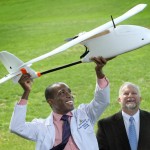 I’ve written a few times recently about the potential uses for drone technology in healthcare, whether it’s the Microsoft project to deploy drones to monitor for disease, or the Dutch project to provide rapid response using them.
I’ve written a few times recently about the potential uses for drone technology in healthcare, whether it’s the Microsoft project to deploy drones to monitor for disease, or the Dutch project to provide rapid response using them.
It’s probably fair to say however, that their first widespread application will be in the delivery of packages, with innovators such as Swiss Post already trialling such delivery mechanisms.
A recent Johns Hopkins study highlights how this could still have significant implications for the healthcare industry however.
Delivering blood samples via drone
The researchers undertook a proof of concept study to test whether blood tests are compromised when samples are moved using drones on journeys up to 40 minutes in length.
The results were positive, suggesting that there is significant potential for drones to transport blood and other samples across reasonable distances. This has particular promise in impoverished rural areas that lack proper transport networks.
“Biological samples can be very sensitive and fragile,” the researchers say, so they wanted to make sure that drones are stable enough both in flight and in landing to carry such delicate cargo.
“Such movements could have destroyed blood cells or prompted blood to coagulate and I thought all kinds of blood tests might be affected,” they reveal, “but our study shows they weren’t, so that was cool.”
Putting drones to the test
The researchers took samples from over 50 adult volunteers at Johns Hopkins Hospital. The samples were driven to a flight site, whereby half of the samples were packaged up and loaded onto the drone.
The drones were then flown for periods ranging from six to 38 minutes in an unpopulated area, and under 100 meters in height to comply with Federal Aviation Administration rules.
The samples were then unloaded and transported back to the hospital for testing. In all, they underwent 33 common lab tests for things such as sodium, glucose and red blood cell count.
Safe passage
The results of the drone couried samples were compared with a second set of samples from the same volunteers that had not gone on such a journey. The analysis revealed that there was no distinction between the two groups, suggesting that the drone transportation had no impact on the samples.
The next stage is for a pilot study to be undertaken in Africa. The researchers reveal that clinics can sometimes be up to 60 miles away from labs, so quick and safe passage of samples is crucial.
“A drone could go 100 kilometers in 40 minutes,” they say. “They’re less expensive than motorcycles, are not subject to traffic delays, and the technology already exists for the drone to be programmed to ‘home’ to certain GPS coordinates, like a carrier pigeon.”
Why not? If it's a more efficient way of transporting things, then lets give it a go.